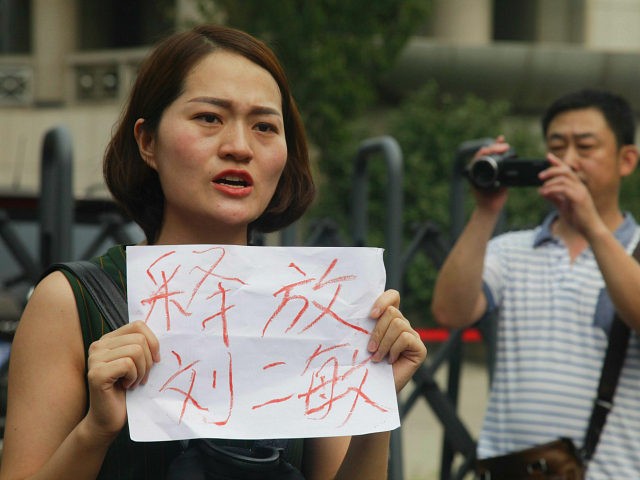Li Wenzu embarked on a march of over 100 kilometers on Wednesday, walking from Beijing to the city of Tianjin to demand an explanation for the detention of her husband, lawyer Wang Quanzhang.
The South China Morning Post explains that Chinese lawyer Wang disappeared in August 2015 after he “took on sensitive cases of complaints of police torture and defended practitioners of the banned Falun Gong spiritual movement.”
As is so often the case with politically inconvenient people in China, he was not properly charged, he was not given access to a lawyer, and he has been allowed no contact with his family.
The BBC described Wang in May 2017 as “the lawyer who simply vanished.” Over 200 other lawyers, legal assistants, and human rights activists were arrested in the crackdown that erased Wang Quanzhang from the face of the Earth, but two years later, he was the only detainee who remained completely incommunicado. Only about two dozen of the others were ever formally charged with a crime, generally some form of subversion charge.
Wang’s wife Li Wenzu said at the time that she did not know if he was still alive. She is walking across the country carrying a picture of Wang next to a giant question mark. Some of the other detainees reported physical abuse, ranging up to outright torture, as they were forced to make televised confessions of guilt.
Li feared her husband might be dead because she thought he would refuse to make a confession under duress. She is marching to Tianjin with the wife of another human rights lawyer, Li Heping, who was reportedly subjected to electroshock torture along with Wang Quanzhang during their captivity.
The BBC recalled Wang telling the story of how he was dragged into the basement of a courtroom a few months before he disappeared and beaten by bailiffs for challenging a judge’s ruling against two of his Falun Gong clients.
The crackdown that swept up Wang was dubbed the “709” operation, as it was launched on July 9, 2015. Its purpose was to eliminate dissent against President Xi Jinping during his rise to dictatorial power. Communist Party publications sneered that the hundreds of detainees were part of “a major criminal gang that has seriously damaged social order.”
Human rights activists argue that the 709 crackdown never really ended, continuing to this day with campaigns of intimidation and harassment. Li Wenzu has endured plenty of harassment, from being driven out of her rented homes and kept under surveillance to Beijing kindergarten classes denying admission to her son.
Radio Free Asia reported on the crackdown ramping up again in March, including the story of a human rights activist who was prevented from picking up her child from school by state security police who implied she had committed some vague offense by talking to foreign media, and ominously warned her not to expect any gentle treatment because she is a single mother. People have been arrested merely for publicly questioning the wisdom of making Xi Jinping president-for-life.
Family members of detained activists reported government efforts to intimidate them out of speaking up for their imprisoned loved ones.
“A lot of people are too scared to speak out right now, including me. Whenever I do, I always feel very nervous, because things are very serious right now,” the wife of imprisoned lawyer Yu Wensheng told Radio Free Asia. Her husband was arrested in January for writing online posts critical of the Chinese government. Before that, he was Wang Quanzhang’s defense attorney — the attorney who was never allowed to meet with his client.
“We are walking to seek an answer from the Chinese legal system. Is China really a country with rule of law?” Li Wenzu asked reporters as she set forth on her mission to rescue her husband. She already knows the answer to that question, but she headed for Tianjin anyway, giving her tyrannical government about 12 days to decide if it wants to stop her.

COMMENTS
Please let us know if you're having issues with commenting.